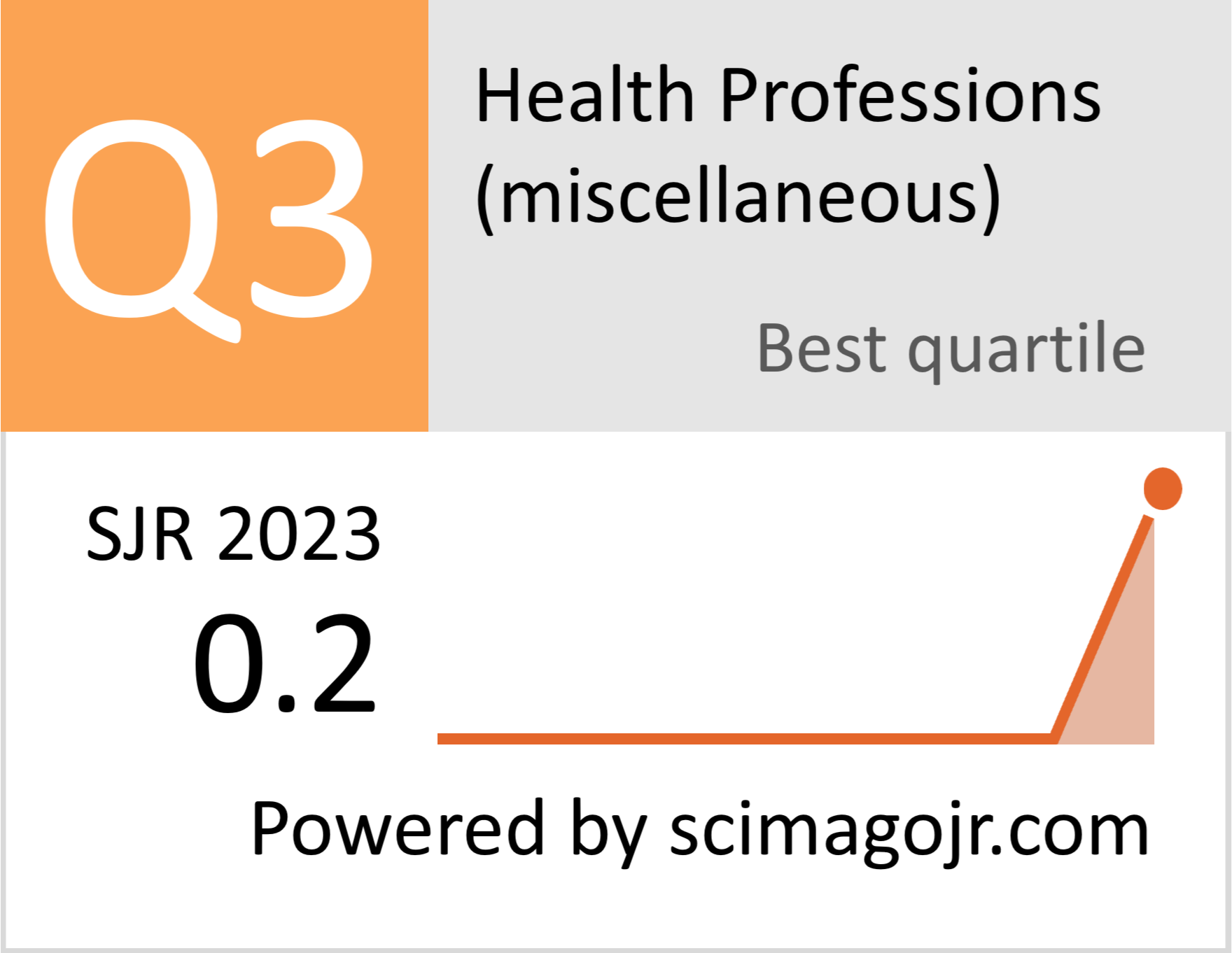Más allá del conflicto y la ambigüedad de roles: una medida global del estrés de rol entre los profesores sudafricanos
Beyond Role Conflict and Ambiguity: A Global Measure of Role Stress among South African School Teachers

Esta obra está bajo una licencia internacional Creative Commons Atribución-NoComercial-SinDerivadas 4.0.
Mostrar biografía de los autores
Antecedentes. El estrés de rol está relacionado con la reducción del rendimiento laboral, la disminución del compromiso organizativo, el aumento de la intención de abandonar el trabajo y los efectos negativos sobre la salud física y mental. Dadas las importantes implicaciones del estrés de rol, los investigadores han tratado de comprender y cuantificar este concepto. Las escalas de Conflicto y Ambigüedad de Roles (RCA) se utilizan ampliamente en la investigación del estrés laboral como herramientas de medición predominantes. Al principio, se conceptualizaron como dos dimensiones independientes: conflicto de rol y ambigüedad de rol.
Objetivo. Este estudio avanza en la investigación de validación de las escalas RCA, explorando su dimensionalidad mediante el Análisis de Escalas de Mokken (MSA) y la Teoría Clásica de los Test (CTT).
Método. Profesores sudafricanos respondieron a las escalas RCA, Maslach Burnout Inventory y Teaching Satisfaction Scale. Se emplearon el Análisis Factorial Confirmatorio (AFC) y el MSA para el análisis de los datos.
Resultados. La investigación determinó que un modelo de segundo orden proporcionaba el ajuste óptimo, indicando que la ambigüedad de rol y el conflicto de rol son dimensiones subordinadas dentro del constructo global del estrés de rol.
Conclusiones. Los resultados del AFC y los índices bifactoriales suplementarios refuerzan la opinión de que el instrumento consta de 13 ítems, que evalúan una dimensión general de estrés de rol junto con dos subdimensiones: conflicto de rol y ambigüedad de rol. Esta especificidad puede conducir a estrategias más eficaces para mitigar el estrés relacionado con el rol, mejorando así el bienestar general de los empleados, la satisfacción en el trabajo y la productividad de la organización.
Visitas del artículo 449 | Visitas PDF 163
- Zhang Y, Crant JM, Weng Q. Role stressors and counterproductive work behavior: The role of negative affect and proactive personality. Int J Sel. Assess [Internet]. 2019;27(3):267-79. doi: https://doi.org/10.1111/ijsa.12255 DOI: https://doi.org/10.1111/ijsa.12255
- Rizzo JR, House RJ, Lirtzman SI. Role Conflict and Ambiguity in Complex Organizations. Adm Sci Q [Internet]. 1970;15(2):150-63. doi: https://doi.org/10.2307/2391486 DOI: https://doi.org/10.2307/2391486
- Fitzgerald A. Professional identity: A concept analysis. Nurs Forum [Internet]. 2020;55(3):447-72. doi: https://doi.org/10.1111/nuf.12450 DOI: https://doi.org/10.1111/nuf.12450
- Biddle BJ. Recent Developments in Role Theory. Annu Rev Sociol [Internet]. 1986;12(1):67-92. doi: https://doi.org/10.1146/annurev.so.12.080186.000435 DOI: https://doi.org/10.1146/annurev.so.12.080186.000435
- Sun L, Gao Y, Yang J, Zang X-Y, Wang Y-G. The impact of professional identity on role stress in nursing students: A cross-sectional study. Int J Nurs Stud [Internet]. 2016;63:1-8. doi: https://doi.org/10.1016/j.ijnurstu.2016.08.010 DOI: https://doi.org/10.1016/j.ijnurstu.2016.08.010
- Chen H, Liu F, Pang L, Liu F, Fang T, Wen Y, et al. Are You Tired of Working amid the Pandemic? The Role of Professional Identity and Job Satisfaction against Job Burnout. Int J Environ Res Public Health [Internet]. 2020;17(24):1-14. doi: https://doi.org/10.3390/ijerph17249188 DOI: https://doi.org/10.3390/ijerph17249188
- Yang S, Qiu Y, He J. Meta-analysis of the impact of role stress on the turnover intention of medical staff in tertiary hospitals. Ann Palliat Med [Internet]. 2021;10(1):469-78. doi: https://doi.org/10.21037/apm-20-2446 DOI: https://doi.org/10.21037/apm-20-2446
- Salari N, Khazaie H, Hosseinian-Far A, Khaledi-Paveh B, Kazeminia M, Mohammadi M, et al. The prevalence of stress, anxiety and depression within front-line healthcare workers caring for COVID-19 patients: a systematic review and meta-regression. Hum Resour Health [Internet]. 2020;18(1):100-14. doi: https://doi.org/10.1186/s12960-020-00544-1 DOI: https://doi.org/10.1186/s12960-020-00544-1
- Sarboozi Hoseinabadi T, Kakhki S, Teimori G, Nayyeri S. Burnout and its influencing factors between frontline nurses and nurses from other wards during the outbreak of Coronavirus Disease -COVID-19- in Iran. Invest Educ Enferm [Internet]. 2020;38(2). doi: https://doi.org/10.17533/udea.iee.v38n2e03 DOI: https://doi.org/10.17533/udea.iee.v38n2e03
- Herman KC, Sebastian J, Reinke WM, Huang FL. Individual and school predictors of teacher stress, coping, and wellness during the COVID-19 pandemic. Sch Psychol [Internet]. 2021;36(6):483-93. doi: https://doi.org/10.1037/spq0000456 DOI: https://doi.org/10.1037/spq0000456
- Kang S-E, Park C, Lee C-K, Lee S. The Stress-Induced Impact of COVID-19 on Tourism and Hospitality Workers. Sustainability [Internet]. 2021;13(3):1-17. doi: https://doi.org/10.3390/su13031327 DOI: https://doi.org/10.3390/su13031327
- Yıldırım M, Arslan G, Özaslan A. Perceived Risk and Mental Health Problems among Healthcare Professionals during COVID-19 Pandemic: Exploring the Mediating Effects of Resilience and Coronavirus Fear. Int J Ment Health Addict [Internet]. 2022;20(2):1035-45. doi: https://doi.org/10.1007/s11469-020-00424-8 DOI: https://doi.org/10.1007/s11469-020-00424-8
- Shahrour G, Dardas LA. Acute stress disorder, coping self‐efficacy and subsequent psychological distress among nurses amid COVID‐19. J Nurs Manag [Internet]. 2020;28(7):1686-95. doi: https://doi.org/10.1111/jonm.13124 DOI: https://doi.org/10.1111/jonm.13124
- Gupta S, Sahoo S. Pandemic and mental health of the front-line healthcare workers: a review and implications in the Indian context amidst COVID-19. Gen Psychiatr [Internet]. 2020;33(5):e100284-e. doi: https://doi.org/10.1136/gpsych-2020-100284 DOI: https://doi.org/10.1136/gpsych-2020-100284
- Khlaif ZN, Salha S, Affouneh S, Rashed H, ElKimishy LA. The Covid-19 epidemic: teachers’ responses to school closure in developing countries. Technol Pedagogy Educ [Internet]. 2021;30(1):95-109. doi: https://doi.org/10.1080/1475939X.2020.1851752 DOI: https://doi.org/10.1080/1475939X.2020.1851752
- Padmanabhanunni A, Pretorius T. “I Teach, Therefore I Am”: The Serial Relationship between Perceived Vulnerability to Disease, Fear of COVID-19, Teacher Identification and Teacher Satisfaction. Int J Env Res Public Health [Internet]. 2021;18(24):1-9. doi: https://doi.org/10.3390/ijerph182413243 DOI: https://doi.org/10.3390/ijerph182413243
- Zang N, Cao H, Zhou N, Jiang L, Li B. Job load, job stress, and job exhaustion among Chinese junior middle school teachers: Job satisfaction as a mediator and teacher’s role as a moderator. Soc Psychol Educ [Internet]. 2022:1-28:1003-30. doi: https://doi.org/10.1007/s11218-022-09719-1 DOI: https://doi.org/10.1007/s11218-022-09719-1
- King LA, King DW. Role Conflict and Role Ambiguity: A Critical Assessment of Construct Validity. Psychol Bull [Internet].1990;107(1):48-64. doi: https://doi.org/10.1037/0033-2909.107.1.48 DOI: https://doi.org/10.1037//0033-2909.107.1.48
- House RJ, Schuler RS, Levanoni E. Role conflict and ambiguity scales: Reality or artifacts? J Appl Psychol [Internet]. 1983;68(2):334-7. doi: https://doi.org/10.1037/0021-9010.68.2.334 DOI: https://doi.org/10.1037//0021-9010.68.2.334
- Netemeyer RG, Johnston MW, Burton S. Analysis of Role Conflict and Role Ambiguity in a Structural Equations Framework. J Appl Psychol [Internet]. 1990;75(2):148-57. doi: https://doi.org/10.1037/0021-9010.75.2.148 DOI: https://doi.org/10.1037//0021-9010.75.2.148
- Smith CS, Tisak J, Schmieder RA. The measurement properties of the role conflict and role ambiguity scales: A review and extension of the empirical research. J Organ Behav [Internet]. 1993;14(1):37-48. doi: https://doi.org/10.1002/job.4030140105 DOI: https://doi.org/10.1002/job.4030140105
- McGee GW, Ferguson CE, Seers A. Role Conflict and Role Ambiguity: Do the Scales Measure These Two Constructs? J Appl Psychol [Internet]. 1989;74(5):815-8. doi: https://doi.org/10.1037/0021-9010.74.5.815 DOI: https://doi.org/10.1037//0021-9010.74.5.815
- Tracy L, Johnson TW. Measurement of role stress: dimensionality of scale items. Soc Behav Pers [Internet]. 1983;11(1):1-7. doi: https://doi.org/10.2224/sbp.1983.11.1.1 DOI: https://doi.org/10.2224/sbp.1983.11.1.1
- Khan A, Yusoff RBM, Khan MM, Yasir M, Khan F. Psychometric Analysis of Role Conflict and Ambiguity Scales in Academia. Int Educ Stud [Internet]. 2014;7(8):104-12. doi: https://doi.org/10.5539/ies.v7n8p104 DOI: https://doi.org/10.5539/ies.v7n8p104
- Özbağ GK, Çekmecelioğlu HG, Ceyhun GÇ. Exploring the Effects of Perceived Organizational Impediments and Role Stress on Job Performance. Procedia Soc Behav Sci [Internet]. 2014;150:1129-36. doi: https://doi.org/10.1016/j.sbspro.2014.09.128 DOI: https://doi.org/10.1016/j.sbspro.2014.09.128
- Kroupis I, Kourtessis T, Kouli O, Tzetzis G, Derri V, Mavrommatis G. Job satisfaction and burnout among Greek P.E. teachers. A comparison of educational sectors, level and gender. Cult. Cienc. y Deporte [Internet]. 2017;12(34):5-14. doi: https://doi.org/10.12800/ccd.v12i34.827 DOI: https://doi.org/10.12800/ccd.v12i34.827
- Lu M-H, Luo J, Chen W, Wang M-C. The influence of job satisfaction on the relationship between professional identity and burnout: A study of student teachers in Western China. Curr Psychol [Internet]. 2022;41(1):289-97. doi: https://doi.org/10.1007/s12144-019-00565-7 DOI: https://doi.org/10.1007/s12144-019-00565-7
- OECD. TALIS - The OECD Teaching and Learning International Survey. 2018 TALIS Results: Teachers and School Leaders as Lifelong Learners and Valued Professionals [Internet]. France: OECD. Available from: https://www.oecd.org/education/talis/
- Maslach C, Jackson SE. The Measurement of Experienced Burnout. J Occup Behav [Internet]. 1981;2(2):99-113. doi: https://doi.org/10.1002/job.4030020205 DOI: https://doi.org/10.1002/job.4030020205
- Ho C-L, Au W-T. Teaching Satisfaction Scale: Measuring Job Satisfaction of Teachers. Educ Psychol Meas [Internet]. 2006;66(1):172-85. doi: https://doi.org/10.1177/0013164405278573 DOI: https://doi.org/10.1177/0013164405278573
- Sijtsma K, van der Ark LA. A tutorial on how to do a Mokken scale analysis on your test and questionnaire data. Br J Math Stat Psychol [Internet]. 2017;70(1):137-58. doi: https://doi.org/10.1111/bmsp.12078 DOI: https://doi.org/10.1111/bmsp.12078
- Stochl J, Jones PB, Croudace TJ. Mokken scale analysis of mental health and well-being questionnaire item responses: a non-parametric IRT method in empirical research for applied health researchers. BMC Med Res Methodol [Internet]. 2012;12(1):1-16. doi: https://doi.org/10.1186/1471-2288-12-74 DOI: https://doi.org/10.1186/1471-2288-12-74
- Mokken RJ. A theory and procedure of scale analysis. The Hague, Netherlands: De Gruyter Mouton; 2011. 364 p.
- van der Ark LA. New developments in Mokken scale analysis in R. J Stat Softw [Internet]. 2012;48(5):1-27. doi: https://doi.org/10.18637/jss.v048.i05 DOI: https://doi.org/10.18637/jss.v048.i05
- R Development Core Team. R: A language and environment for statistical computing. R Foundation for Statistical Computing Vienna, Austria: R Foundation for Statistical Computing; 2013. Available from: http://www.R-project.org/
- DeVon HA, Block ME, Moyle-Wright P, Ernst DM, Hayden SJ, Lazzara DJ, et al. A Psychometric Toolbox for Testing Validity and Reliability. J Nurs Scholarsh [Internet]. 2007;39(2):155-64. doi: https://doi.org/10.1111/j.1547-5069.2007.00161.x DOI: https://doi.org/10.1111/j.1547-5069.2007.00161.x
- Jöreskog KG, Olsson UH, Wallentin FY. Confirmatory factor analysis (CFA). In: Jöreskog KG, Olsson UH, Wallentin FY, editors. Multivariate analysis with LISREL: Springer; 2016. p. 283-339. DOI: https://doi.org/10.1007/978-3-319-33153-9_7
- Dueber DM. Bifactor Indices Calculator: A Microsoft Excel-based tool to calculate various indices relevant to bifactor CFA models. Educational, School, and Counseling Psychology Research Tools. University of Kentucky’s Institutional Repository. 2017. doi: https://doi.org/10.13023/edp.tool.01
- Reise SP, Scheines R, Widaman KF, Haviland MG. Multidimensionality and Structural Coefficient Bias in Structural Equation Modeling: A Bifactor Perspective. Educ Psychol Meas [Internet]. 2013;73(1):5-26. doi: https://doi.org/10.1177/0013164412449831 DOI: https://doi.org/10.1177/0013164412449831
- Reise SP, Bonifay WE, Haviland MG. Scoring and Modeling Psychological Measures in the Presence of Multidimensionality. J Person Assess [Internet]. 2013;95(2):129-40. doi: https://doi.org/10.1080/00223891.2012.725437 DOI: https://doi.org/10.1080/00223891.2012.725437
- Yaacob M, Long CS. Role of Occupational Stress on Job Satisfaction. Mediterr J Soc Sci [Internet]. 2015;6(2 Suppl 1):81-7. doi: https://doi.org/10.5901/mjss.2015.v6n2s1p81 DOI: https://doi.org/10.5901/mjss.2015.v6n2s1p81
- R Richards KA, Washburn NS, Hemphill MA. Exploring the influence of perceived mattering, role stress, and emotional exhaustion on physical education teacher/coach job satisfaction. Eur Phy Educ Rev [Internet]. 2019;25(2):389-408. doi: https://doi.org/10.1177/1356336X17741402 DOI: https://doi.org/10.1177/1356336X17741402
- Xu L. Teacher-researcher role conflict and burnout among Chinese university teachers: a job demand-resources model perspective. Stud High Educ [Internet]. 2019;44(6):903-19. doi: https://doi.org/10.1080/03075079.2017.1399261 DOI: https://doi.org/10.1080/03075079.2017.1399261



